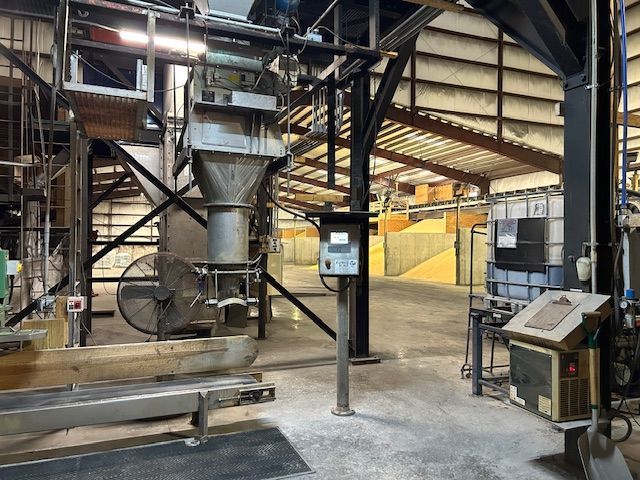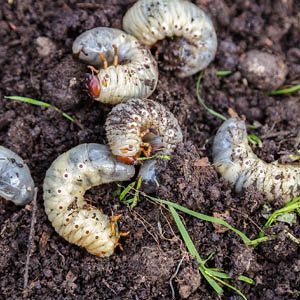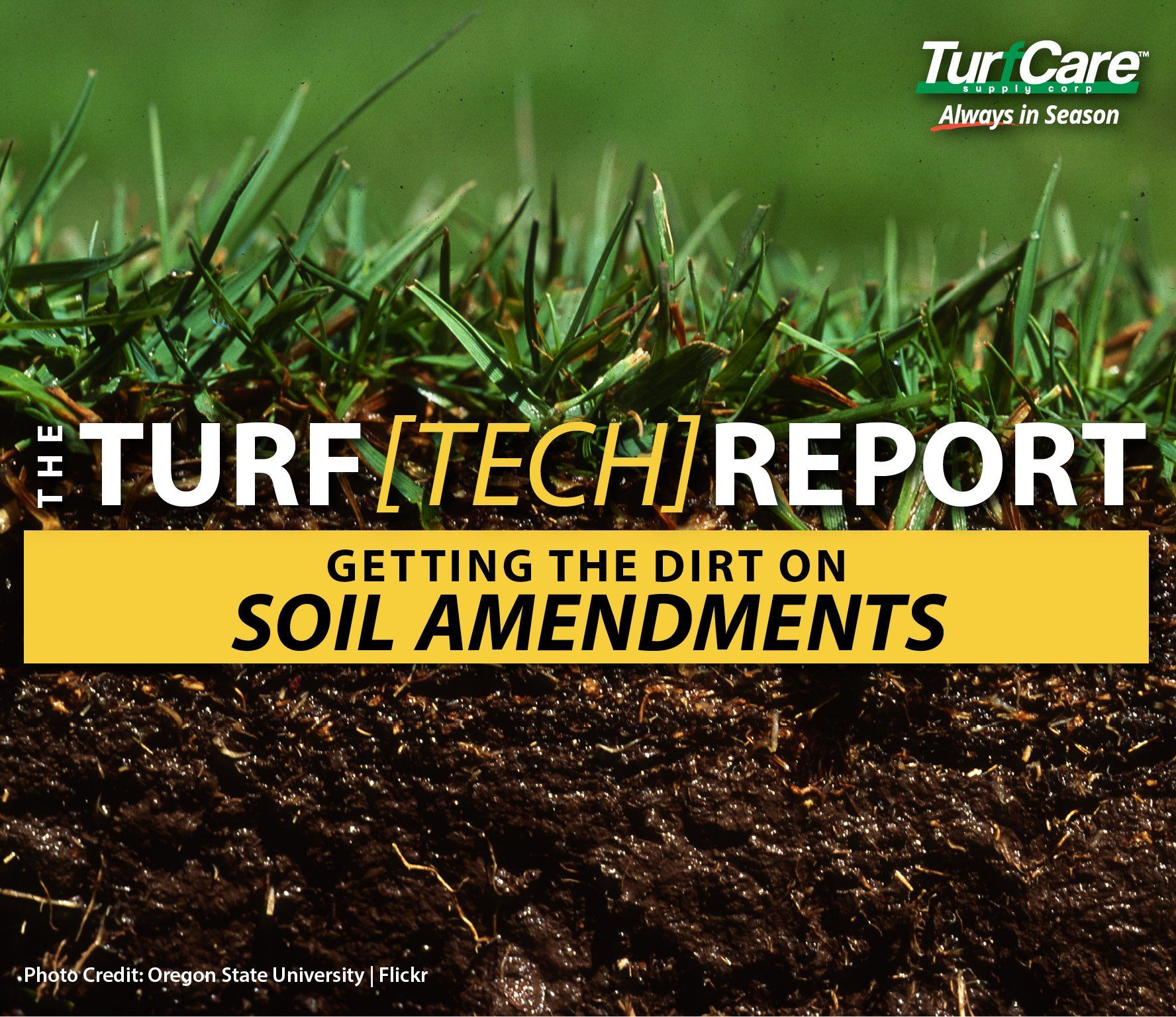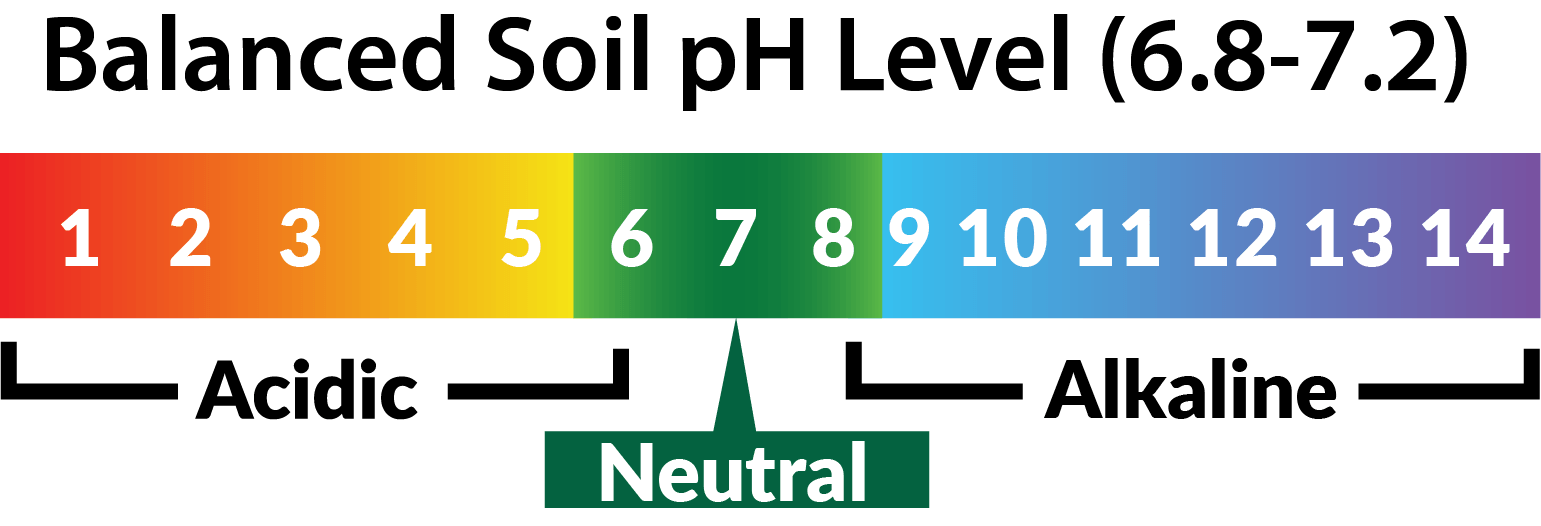GETTING THE DIRT ON SOIL AMENDMENTS
The success or failure of turf is directly related to the quality of the soil and how it has been treated and/or managed throughout its growth cycle. One way to greatly improve soil quality for turf grass is to apply a soil amendment to condition the soil. Soil amendments are used to enrich the soil and provide a better growing environment for plant roots, which strengthen turf and ensures proper nutrient uptake. But what exactly is a soil amendment, when should you use one and what type should you use? This article will answer these questions and more as we give you the “dirt” on soil amendments.
WHAT EXACTLY IS A SOIL AMENDMENT?
Sportsfield Magazines’, Dr. David Gardner defines soil amendments in his article “The Science of Soil Amendments,” as being:
A soil amendment is anything added to the soil for the purpose of improving either its chemical (pH, nutrient status) or physical (water retention, permeability, drainage) properties. (Gardner, sportsfieldmanagementmagazine.com)
It’s important to understand that a soil amendment is not to be confused with fertilizers because they do not add nutrients to soil for plant growth but rather cultivate a positive growing environment for improved plant growth. Applications of soil amendments should be applied yearly to maintain soil that is loose and healthy allowing proper root growth, nutrient uptake and in some cases a balanced pH level.
WHY APPLY A SOIL AMENDMENT TO A LAWN?
Fertilizing an area is just not enough when preparing and managing a lawn’s health. Although fertilizer can put needed macro nutrients like Nitrogen, Phosphorus and Potassium back into the soil, without additional soil treatments nutrients can be locked up in the soil (due to an unbalanced pH), suffer from improper irrigation (caused by compaction/sandy or clay soil) and micro nutrient deficiency (because of natural or over tilled depletion). In order to achieve and maintain successful plant health and function you need to apply a soil amendment that chosen based on need, can result in the following:
- Enhance Nutrient Uptake
- Increase Moisture Storage
- Promote a Healthy Environment for Root Growth
- Assist in Temperature and Drought Hardiness
- Improve Tolerance Against Environmental Stresses, Heat, Dry Weather and Foot Traffic
- Increase Healthy Green and Lush Appearance
- Improve Germination and Seeding Growth
- Neutralize Soil pH
- Enhance Efficiency of Future Fertilizer Uptake by Plants
It’s imperative to test the soil to better understand pH and macro nutrient deficiencies in order to figure out which soil amendment is best suited for each specific lawn. Identifying soil pH is important prior to soil amendment application because you must determine if the soil is acidic or alkaline before you know which product to use.
WHAT’S THE KEY TO SUCCESS WHEN CHOOSING A SOIL AMENDMENT?
The key to success is properly identifying your soil needs and choosing the best and most effective product. There are a variety of soil amendments on the market that manage different types of soil issues and can be broken down into two different general categories, organic and inorganic:
ORGANIC SOIL AMENDMENTS
Organic Soil Amendments
come from something that was once alive. This type of amendment is great for both chemical and physical soil improvements. Organic amendments include peat, compost and wood ash.
- Peat is a brown, soil-like material characteristic of boggy, acid ground, consisting of partly decomposed vegetable matter. This is semi-renewable resource and is an excellent amendment for sandy soils since it has high water retention and raises pH levels. This is great for soils that are too alkaline since it is retained from a boggy, acidic ground.
- Compost is a broad category that refers to decomposed organic matter that is not regulated and can include a combination of plant-based compost, biosolids, manure-based composts and other agricultural by-products, such as chicken feathers or straw. Compost can improve soil’s structure water management including better drainage or water holding capability depending on soil type (i.e. sand or clay). Use caution when applying manure-based composts or biosolids since these amendments have a higher salt content. Plant-based compost like grass clippings or wood chip compost are more expensive but contain a low salt content (to reduce cost, you can reuse your own grass clippings). NOTE: Amending a soil is not the same as applying mulch to topsoil because to be a true soil amendment it must be thoroughly mixed into the soil. Mulch is left on top of the soil to reduce evaporation and runoff as well as prevent weed growth.
- Wood ash is the powder left over after wood has been burned from a fireplace, wood stove or an industrial power plant. Wood ash is high in potassium so when water is added to it, it forms potassium hydroxide, a compound that is highly alkaline. This acts as a natural substitute for lime that will alter the soil’s chemical property by raising the soil pH. Although wood ash amends soil pH, it requires roughly 2-3 times more of the amount of wood ash compared to one application of lime which over time may become costly and time consuming. Other cautions to be aware of is the type of wood being burned for wood ash use because each species of wood contains different percentages of potassium that will affect turf grass. Do NOT use coal, charcoal, lead-painted or chemically treated ashes as they will lead to toxins introduced to plants.
INORGANIC SOIL AMENDMENTS
Inorganic Soil Amendments
have been mined or man-made. Depending on the material, this amendment can improve either the physical or chemical properties of soils, but seldom manage both. This includes Lime, Gypsum and Granulated Sulfur.
- Lime products include calcitic limestone (containing finely ground pure calcium carbonate) and dolomitic lime. The chemical definition of lime is calcium oxide and is defined as being a calcium or calcium-magnesium containing product used on lawns. Lime’s benefits to turf grass alter its chemical properties which makes it capable to neutralize soil acidity by raising soil pH and reducing harmful effects of an imbalanced soil. There are Enhanced Lime products available which have added ingredients that increase the effects of lime and improve product benefits.
- Gypsum, also known as calcium sulfate, modifies chemical properties of soil by lowering salt levels which then helps alter its physical properties over time, resulting in increased soil aeration, structure and permeability. Gypsum also replenishes soil’s essential macro-nutrients, calcium and sulfur, that are not applied during fertilization. This amendment is great for any soil type since it will improve soil structure while not altering pH. TIP: Gypsum is a perfect soil amendment to use against salt damage from winter.
- Granulated Sulfur is another key player in neutralizing soil by adding more acidity to it. In soil that is too alkaline, an addition of sulfur will change the chemical properties of soil because microorganisms will begin to oxidize the added amendment into sulfuric acid which in turn brings pH to a more acidic level. This process unlocks iron necessary for plant growth, making it more soluble and easier to absorb by plant roots.
Overall, soil amendments are an important addition to the success of a lawn. Even though there are multiple amendments out there it’s important to understand the pros and cons of each. Although organic amendments are very true to their original form and can alter both chemical and physical soil properties, they can be unpredictable, since mother nature is not regulated, which can cause inconsistent results. Inorganic amendments improve chemical properties rapidly but involve time and an adopted fertilization regime to alter physical properties. Time and consistency will provide desired results. In the end, a regular, healthy turf care routine including proper fertilization, aeration, watering, and mowing
is needed in order to help maintain soil amendments properties in soil.
For professional fertilizers, humic and AMP-XC™ enriched products available, please visit TurfCare’s online Product Catalog.
For green industry professionals or others interested in ordering Turfcare products, please contact our Customer Service
to find a distributor near you.
References:
http://extension.colostate.edu/topic-areas/yard-garden/choosing-a-soil-amendment/
http://extension.illinois.edu/lawntalk/planting/soil_and_site_preparation.cfm
http://www.wisegeek.com/what-are-the-different-types-of-soil-amendments.htm
http://www.sportsfieldmanagementmagazine.com/columns/turf-health/soil-amendments/
http://web.extension.illinois.edu/state/newsdetail.cfm?NewsID=12505
http://homeguides.sfgate.com/sulfur-work-lawns-85117.html
Turf Care Supply - TurfReport Blog

Turf Care Supply, LLC, a portfolio company of Platte River Equity, has officially acquired Beaty Fertilizer, the industry respected Tennessee-based manufacturer and blender of custom granular and liquid fertilizers, as well as combination products. This strategic move expands Turf Care’s manufacturing footprint, adds new product capabilities, and enhances overall production capacity. “The partnership with Beaty Fertilizer marks a major milestone in our journey and an important step forward in our mission to grow, innovate and lead in our industry,” said Mark Mangan, President of Turf Care. “This acquisition is more than just expansion; it’s a powerful opportunity to strengthen our product offerings, broaden our market reach and provide greater value to our customers. By welcoming Beaty into the Turf Care family, we are reinforcing our commitment to excellence and positioning ourselves for an even brighter future.” “We are excited about this next step in the Beaty Fertilizer story. For almost 50 years, our family and our employees have worked hard to serve customers and communities with pride and heart,” said John Beaty, President of Beaty. “Now, we are embracing an opportunity for growth with Turf Care. With our combined know-how and resources, we’ll keep building on what we’ve worked so hard to create and bring even more value to our customers, employees and partners. We truly believe this partnership will keep the Beaty legacy going strong while opening up new doors for growth and innovation.” Tarun Kanthety, Vice President at Platte River, added, “We believe the acquisition of Beaty Fertilizer represents a strategic step in expanding Turf Care’s footprint and product breadth... as it scales and enhances its value proposition to customers.”

Root out Grubs, Before they Attack Yours! White grubs, the immature stage of several scarab beetles—including Japanese beetles, masked chafers, May and June beetles, and green June beetles—are a major threat to turfgrass across the Southeast. These beetles follow a complete metamorphosis (egg, grub, pupa, adult), with most species completing their cycle in one year. Eggs are laid in early summer, grubs hatch within two weeks, and begin feeding on turfgrass roots through the late summer and fall. May and June beetles differ slightly, with a two- to three-year life cycle and prolonged feeding as third-instar grubs. Grubs damage turf by severing roots, causing grass to yellow, wilt, or lift easily from the soil. Feeding is typically concentrated in patches and worsens during hot, dry weather. Wildlife digging for grubs can create further turf destruction. Healthy turf may tolerate 5–10 grubs per square foot, but damage becomes evident as populations rise or turf is under stress. Early detection and timing are essential. Scouting begins in late June, shortly after adult beetle activity peaks. Monitoring plants favored by beetles can signal egg-laying is underway. Treatment is most effective when small grubs are active—typically from mid-July through early August. For professional turfgrass managers, insecticides containing imidacloprid (Merit®), chlorantraniliprole (Acelepryn®), or trichlorfon (Dylox®) are the most effective tools. The primary months of preventative application of Acelepryn® is from April to end of May and Merit® from April into July - targeting grubs before they hatch. Curative treatments with Dylox® or similar products are applied July through the fall, when young grubs are feeding and most vulnerable. Always follow label directions for optimal application and safety. Timing may vary slightly by regional seasonal needs. Turf Care Supply has a variety of professional TCS Growstar insecticide fertilizers available to protect your turf and prevent grub damage, before it starts. Click on the button below to view products, contact your sales rep for addition TC Growstar products available.

Platte River Equity Portfolio Company Turf Care Supply, LLC Acquires Agri-Nutrients, Inc. Brunswick, OH , October 9, 2024 – Platte River Equity (“Platte River”) portfolio company Turf Care Supply, LLC (“Turf Care”) is pleased to announce its acquisition of Agri-Nutrients, Inc. (“Agri-Nutrients”), a manufacturer and blender of custom granular fertilizers for the turf & ornamental (“T&O”) industry. This strategic acquisition provides Turf Care with an established presence in the south-central United States, an enhanced product portfolio and additional manufacturing capacity. “This acquisition represents much more than a business transaction; it is a strategic step forward in expanding our reach and enhancing our customers’ growth. By bringing Agri-Nutrients into the Turf Care family, we are broadening our product portfolio, expanding our market presence and further positioning ourselves as a leader in providing innovative solutions for our customers,” said Mark Mangan, President of Turf Care. “We are excited about joining the Turf Care team,” said Jim Montgomery, President of Agri-Nutrients. “At Agri-Nutrients, our core values center around customer service and product innovation, and we are confident that this combination will allow us to better serve the needs of our customers.” “Platte River welcomes the Agri-Nutrients team to Turf Care. This transaction underscores our long-term commitment to fostering growth through both organic and inorganic initiatives across the Turf Care platform,” said Tarun Kanthety, Vice President of Platte River. “The partnership with Agri-Nutrients strengthens Turf Care’s value-added offering, creating additional growth opportunities across the combined customer base.” B&A Corporate Advisors served as the exclusive financial advisor to Agri-Nutrients. About Agri-Nutrients Founded in 1992 and based in Catoosa, OK, Agri-Nutrients is a manufacturer and blender of custom granular fertilizers for the T&O industry, predominantly selling into the lawn care, sports turf and golf course end markets. About Turf Care Supply Established in 1974, Turf Care Supply is one of the largest formulators and blenders of urea products to the T&O market. Turf Care has a comprehensive product portfolio of fertilizers, combination products (herbicide/insecticide), soil amendments and enhanced efficiency fertilizer ingredients. Turf Care's products are sold to distributors and blenders serving the commercial, residential and golf end markets. Turf Care operates four manufacturing facilities strategically located throughout the eastern U.S. About Platte River Equity Founded in 2006 and based in Denver, CO, Platte River Equity is a private equity firm focused on investments in established lower middle market operating companies within targeted industrial sectors where it has substantial operating and investing experience. Platte River utilizes prudent capital structures in order to invest in future growth opportunities and withstand changing economic environments. The firm also provides significant ongoing support to its portfolio companies through dedicated resources across functional areas. The firm has raised funds with committed capital in excess of $1.6 billion and is currently investing out of its fifth fund. The Platte River team is the largest collective investor across its funds, deeply aligning the firm with its investors and portfolio company management teams.


